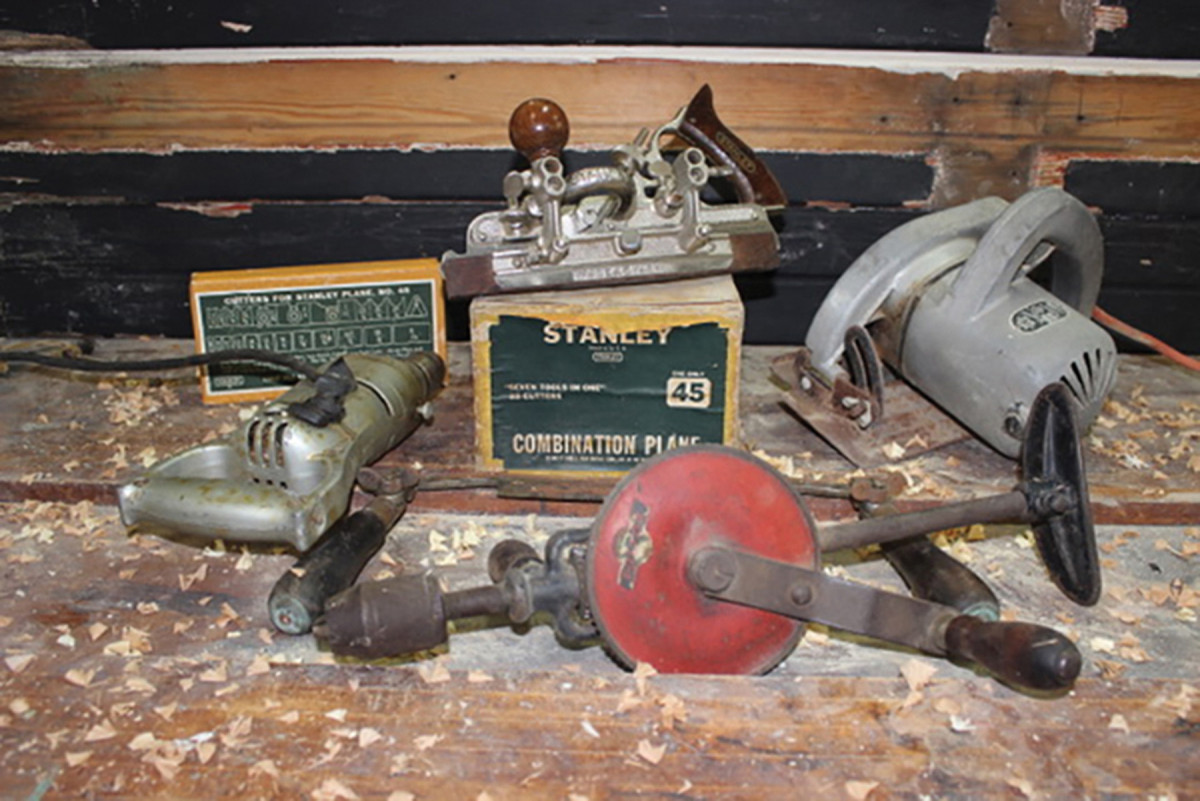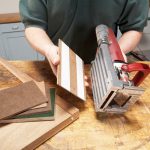We may receive a commission when you use our affiliate links. However, this does not impact our recommendations.

1. Pop and his wife on a homemade trailer.
When a family friend recently visited my new cabinet shop, he commented, “Your dad and grandpa would’ve loved this place. It wasn’t always like this!” He meant that although both men were pro woodworkers at various times in their lives, neither ever experienced the pleasant working conditions, robust tools, or the wide variety of materials, finishes and other resources that we enjoy today–and at times perhaps take for granted.
As I thought about this later, it brought back good memories–images, sounds and aromas–that I hadn’t consciously pondered in decades. In the 1950s, when health issues forced my maternal grandfather (“Pop”) to retire early, he set up a small wood shop. Pop still did his daily work on an ancient 8″ bench saw with a rag tied over his face to mitigate the dust, and we couldn’t take more than two steps without bumping into a tool, a wall or each other. The shop was little more than a 10′ by 10′ appendage to the back of the garage, poorly lit and ventilated. Today few people would consider that space an adequate garden shed, let alone a working shop.

2. A few of Pop’s tools, still getting some use in the author’s shop.
Pop’s tools were a study in frugality. I don’t remember him owning a tape measure, but he did have a drawer full of folding rules that had been broken over the years at various random lengths. “Why toss out a perfectly good rule that measures out to 2 feet,” I can still hear him saying. He probably hadn’t bought a new hand tool since Prohibition, but just kept replacing handles, regrinding tips, renewing edges and doing what was necessary to keep the old tools in service.
In those days, before imported alternatives, power tools were quite expensive in terms of total household income, more so than today. This (along with the huge postwar DIY movement) created a market for multipurpose machines and kit-based, shop-built power tools. Pop’s budget consciousness, however, avoided even these. Besides the small table saw, his go-to daily arsenal of equipment included a 4″ jointer, a ’40s-era bench top shaper, a curious little 5″ circular saw, a couple of well-worn 1/4” drills, and a homemade 12″ disk sander. Virtually all of these were acquired secondhand or rescued from certain death and refurbished. If Pop’s consumer philosophy were distilled into a credo, it would have been something like, “Nothing is ever really worn out. You can always find a way to repurpose or use it some more.”
What, you might ask, motivated this reflexive devotion to thrift and self-reliance? I don’t think there was any single factor, but certainly childhood poverty, and the ethos of survival, self-denial and deferred gratification that characterized those who lived, worked and raised families through the Great Depression and WWII played a large part. There’s also much to be said for the sense of accomplishment, perhaps fading now from our common experience, that comes from simply making do—by dipping into our creativity and resourcefulness and using what we have on hand—rather than running to town with our debit card whenever a need arises.
I was captivated by Pop’s stacks of vintage how-to and woodworking magazines, some of which even then were 20 to 30 years old. I would spend hours immersed in them. After supper we might look over a project article or two, and he’d explain how thus-and-such was a good idea, or suggest improvements. His mind was full of fascinating “hacks” – for both the shop and life in general. I remember (and still use) many of them, and often wish I’d written them all down. Money can’t buy a more valuable “apprenticeship” than that.
Sometimes, when the shop is quiet, my thoughts wander back to those days when Pop taught me how to tune a plane, or roll the edge of a card scraper, or any of a thousand other things. Would he understand why my work today requires a line boring machine, multiple saws/shapers/etc., or a shop that’s bigger than my first house? In some ways I think he would, but probably not without pointing out some things I could do to get by with less.
John Rooney is a cabinetmaker in Texas.
Here are some supplies and tools we find essential in our everyday work around the shop. We may receive a commission from sales referred by our links; however, we have carefully selected these products for their usefulness and quality.








